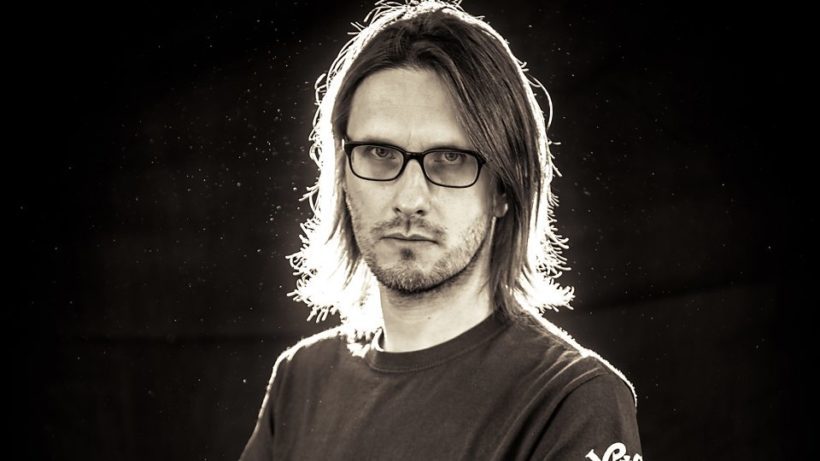
Steven Wilson, currently also in Blackfield and formerly in Porcupine Tree, likes to poke the proverbial bear. Not necessarily the taste of his fanbase but rather that of his own creation. Over time, Wilson has challenged his own limitations, experiences, and methods. This is particularly true of Wilson’s entire discography, but prominently on new album, To the Bone, where he upended the serious, conceptual progressive rock of Hand. Cannot. Erase. and The Raven That Refused to Sing (And Other Stories) to emote something else — like joy, for example — entirely. For most, seeing their favorite artist head-up (not head-down), bright eyed, and smiling is always reassuring psychologically. Musically, however, Wilson has created an album full of positivity, something even the melancholic song “Pariah” emanates lyrically, that has, to some degree, shocked long-time fans. They’ve become accustomed to Wilson’s long form anxiety and overcast compositional approach.
To the Bone is a wonderful record. It spans Wilson’s entire gamut of musical input, but focuses expressly on his love (and origins) of pop music. From ABBA to Prince to The Bee Gees to Tears for Fears, To the Bone represents a full-on view of a proper (or traditional) pop record. From opener “To the Bone” and “Refuge” to “Pariah” and the polarizing “Permanating,” Wilson’s fifth record constructs an easy-to-digest set of songs that are meant for car rides, showers, and sing-a-longs with friends. There is a small sense of foreboding but it’s always capped with a sense of positive resolution. To that end, To the Bone is unique to Wilson’s overall oeuvre and should be listened to and enjoyed as such, much like Porcupine Tree’s Stupid Dream, which also faced minor uproar over it’s pop-like approach in 1999.
Decibel talks to Steven Wilson to understand why To the Bone has resonated so strongly with Wilson’s new and long-time fans. Not to mention himself.
There seems to be a bit of anxiety on To the Bone, but there’s also a lot of hope.
Steven Wilson: No, actually. There’s a lot of positivity on this record. It surprised people. And it caused a bit of controversy, which I love. There’s real joy on this record. Obvious musical joy. The music is particularly joyful in parts. There are, of course, places where the music isn’t upbeat, but the message is joyful, very hopeful. For instance, the last song on the record, “Song of Unborn,” is a very melancholic song—very typical of me—but the message is this: “the world is very fucked up place and the human race has basically failed, but the gift of life is something extraordinary. It’s up to each and every one of us to do something profound with our lives.” That is something that’s very positive. It’s partly because the world isn’t getting better—it’s getting worse—so it would be too easy to sit and wallow in that misery and negativity. It’d be very easy to do a record like that. My previous record, Hand. Cannot. Erase., was very paranoid, anxious, insecure about a young woman coming to the city and disappearing into the modern world. I didn’t want to do another record that was profoundly negative. I wanted to do a record that was reflective of me as a person. I’m not a particularly negative person. I look at the world and it’s hard to be completely positive, but I have a good life. I love my life. I love my career. I enjoy what I do. I wanted that to be balanced on this record.
There is balance on To the Bone. I look at “Pariah” and “Permanating” as possible opposite ends of the spectrum.
Steven Wilson: In a way, but even “Pariah” has a positive message. The man is saying, “What’s the point of getting out of bed in the morning.” The woman is saying, “You have everything to life for.” In a way, there’s a ray of sunshine. Musically, yes, it’s a bit melancholic.
“Permanating” was a surprise though. I remember thinking, “What is going on here? Why would Steven do this to me?” Then, I fell in love with the song. It’s very ABBA.
Steven Wilson: It’s a very joyous piece of music. You’re on the right track. It’s a very nostalgic track for me. From my childhood. The very first music I heard was ABBA and the Saturday Night Fever soundtrack and Motown stuff. It’s life-affirming pop music. A lot of people had the same reaction as you did. But now it’s the most popular song in our set. Every single night it gets the best response. Even the grumpy, intellectual-looking prog snobs end up being swept away with it. And I think that’s really interesting.
Steven’s fallen off the prog rock mountain with “Permanenting.” But anyone who’s followed during your Porcupine Tree or Blackfield days will understand that your musical scope is quite wide.
Steven Wilson: That’s quite right. I will say the last two records have created a new audience for me. The last two records were very heavy on the conceptual rock side. Very muso. That did create this new idea of me as someone who made conceptual rock albums, and that’s all I did. If you combine that with the fact that I was remixing a lot of the classic rock and prog albums of the era—[King] Crimson, Jethro Tull, Yes—I became the prog rock guy. That they tend to overlook I was also remixing Tears for Fears, Chicago, Simple Minds, and XTC is symptomatic of their musical view. They don’t see the other things I’ve done or that I’m doing as, I guess, visible.
Tears for Fears definitely has progressive elements. They don’t write simple, mundane pop songs. They’re very layered, detailed, and complex.
Steven Wilson: I would tend to agree, but that also depends on your definition of prog rock. Most people have a fairly broad view on what constitutes prog rock. There is a minority that don’t, however. The last couple of records I did were very conceptual and very muso. They fit right in with their definition of prog rock. I took great delight in smashing that illusion apart with To the Bone. If you look at my back catalog, pop music and pop sensibilities have always been a very strong part of my musical DNA. I love pop music. I grew up in the ‘80s, which was a great decade for pop music. Like Prince, Michael Jackson, Tears for Fears, Talk Talk, or Depeche Mode. That’s the music I grew up with. Not King Crimson, Yes, and ELP. Most of that stuff was going on before I was born. Or, at the very least going before I was even aware of music. I went back and discovered that stuff. The music I grew up with was pop from the ‘80s. I suppose I have myself to blame. That I was only making very serious conceptual rock albums. It was important for To the Bone to smash that a bit. Inevitably, I was going to make a record that called upon my pop background, and this was the record. It’s completely repositioned me again. I’m no longer just the prog rock guy, which is great! I love the idea that I can do what I want.
Did you have any apprehensions about breaking your own stereotype? The serious prog guy suddenly is writing in major chords and has a smile.
Steven Wilson: [Laughs] Fear? No. There have been many points in my career where I’ve confronted the expectations of the audience. When Porcupine Tree did In Absentia, we embraced metal in a very big way. I lost a lot of fans. Almost overnight. It was too heavy for some. There have been a number of records throughout my career where I’ve apparently changed direction. Not that I’ve turned my back on my fans, but I’ve always wanted to take them with me. When you do that you alienate fans. I never want to do that. But I realize I’ll lose fans. That’s part of the contract you have with fans. I think 2016 was a watershed year for pop. We lost Bowie and Prince within a few months of one another. Bowie and Prince are quintessential examples of artists willing to reinvent themselves, risking everything their commercial standing in order to evolve as artists. I don’t put myself anywhere near them as artists, but philosophically I’m right there with them. I think if I wasn’t upsetting people, if I wasn’t making people angry, or if I wasn’t making people feel uncomfortable, then I’d feel uncomfortable. If I’m giving people more of what they want is that what I should be doing? The answer is no. From the very get-go of my career, I thought I created this bubble, wherein people expected me to change. Just look at the first couple of Porcupine Tree records. The first one was psychedelic. The second one was very into ambient and techno music. Straight away if you create a climate where people expect you to change you set yourself up. When you make 10 records and suddenly change that’s when the fanbase isn’t so receptive.
There’s an expectation you have to meet, right? If you’re not meeting expectations, then you’ve failed them as an artist. That’s a pretty common feeling with music.
Steven Wilson: There people who like the same breakfast every morning. They like their routine. Their normality. I’d like to think I created a fanbase that was interested in change, evolution, and diversifying. That seems to be borne out by the fact that as much as I’ve changed my career has gone up. It hasn’t taken a nosedive yet. Now, knock on wood, right?
When Porcupine Tree ended it did seem that was it for Steven. You quit at the top, so to speak. But your solo work has also continued your upward trajectory. There’s more acceptance of Steven than Porcupine Tree.
Steven Wilson: I try to get hung up with genres. That’s up to people to determine. When I look at my back catalog, I see ambient, jazz, singer-songwriter, metal, psychedelia, electronic, and pure pop. To me, it’s all mixed up. In a way, mixing all that up is truly progressive. That’s what Bowie did. In 2018, it’s impossible now to surprise people with something they haven’t heard before. The musical vocabulary is pretty much established. I’m not talking about me either. I’m talking music in general. The only thing you can do is add your personality to it all to make it sound fresh again. Bowie, Zappa, and Prince were good examples. Everything they did sounded like them. I’d like to think I’m getting to that point where it doesn’t matter if I do “Permanting” or a 20-minute progressive rock suite or a singer-songwriter song or an ambient piece. People are going to say, “Hey, that’s Steven Wilson.”
I hate to beat the Porcupine Tree drum again, but you’ve had that since Signify.
Steven Wilson: I think so. There’s a lot of different styles on that record. In that way, I think you’re right. The new record, To the Bone, isn’t a massive shock to the system. “Permanating” taken in isolation, yes, but there’s songs on this album that could be on Stupid Dream. Then again, Stupid Dream did have “Piano Lessons.” But I don’t want to overstate this: it was a very small minority that reacted negatively to “Permanating.” They were the people who had discovered me on the two previous records. Perhaps they positioned me as one thing but didn’t really go back and discover what I was before. The clues were there or are there, right?
To the Bone is more of a solo record for you. How is that different from Hand. Cannot. Erase. where you had a full-time band?
Steven Wilson: It is different. I’m the guitar player again. I made a few records where I wasn’t the guitar player. I wasn’t the lead guitar player. This time around I’m the lead. I haven’t been the lead since the last Porcupine Tree record. So, that was fun to re-discover my guitar playing chops, constructing solos, tones all that stuff. I’m also playing the keyboards on this record. So, in a way, it’s almost like going back to the first Porcupine Tree record, which was just me on my own in my bedroom. Insurgentes is also a bit like that. This feeling returned where I’m not particularly good at the instruments I’m playing but I know what I can do to get what I want out of them.
You’ve commented on that before. Where you’re not a classically trained musician. People expect you to be, however.
Steven Wilson: I approach instruments like an idiot. I mean that in a complimentary way. There’s a great quote from Gregg Toland, who did Citizen Kane. He said the reason why he wanted to work with Orson Wells is that Orson Wells knew nothing about film. There’s something about a naïve approach that can be very creative. The rules just aren’t there. There are no rules. There’s something about making music or art like an idiot that makes sense. Most of the great music isn’t by people who are trained musically. How many great bands have come out of music schools? None. Bands or great artists come from inner cities, the suburbs, the rural areas. They’re responding to their environment, the magic they hear. They’re instinctive. The word ‘amateur’ comes from the French word for love. To love what you do is to be an amateur. People have a negative association with the word amateur. But it’s not. Yes, I’m an amateur. Yes, I love what I do. I do it because I love it. Being an amateur isn’t an insult but a compliment. I still approach things in an amateur way. I don’t know the names of the chords. I don’t need an additional layer of intellectual bullshit. But there’s always exceptions of the rule. I know that.
It’s almost been a year since To the Bone. You’ve had some time to live with it. How is the record aging with you?
Steven Wilson: I have the same relationship with all my past music. I don’t want to hear any of it again. Not because I’m not proud of it—of course, I’m incredibly proud of it—but when you’ve spent so much time writing, arranging, record, mixing, mastering, proving test pressings, all that stuff. Inevitably, you never need to hear it again. Maybe when I’m 60 or 70 I’ll be able to listen to my records again. I just recently remastered In Absentia and Deadwing. It’s been 15 years since I last heard those records. I don’t really need to hear them in detail. It’s like looking at an old photo album, with all the terrible clothes and bad hair. I wasn’t looking forward to remastering those albums. But I was surprised. There are some really good songs on those albums. I quite enjoyed “Glass Arm Shattering.” Others not so much. I still need distance from those old records. I’m glad I can focus on To the Bone. Not on record but on stage, which is where the songs come alive, I think. They’re so much fun to play. I’m really proud of the songs.
** Steven Wilson’s new album, To the Bone, is out now on Caroline International. Click HERE to order the UK CD or LP. Click HERE to order the US CD or LP.





